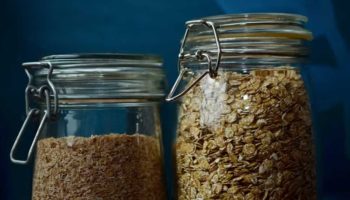If you have a beautiful flower garden or a well-tended vegetable garden, you don’t want to deal with insects that destroy your plantations and spread diseases among your plants! If you’re tired of pests infesting your flowers, fruits and vegetables, know that there are several organic ways to control them! Today, let’s look at how to get rid of aphids with baking soda in no time!
-
Baking soda, olive oil, washing up liquid
Aphids are the enemies of your garden! These insects suck and chew the stems and leaves of plants, inflicting multiple damages until they are destroyed. In addition, they are great disease vectors! Control them with this natural bicarbonate leaf aphid killer! How? It’s very simple! Prepare your own solution at home!
Ingredients:
- ½ teaspoon baking soda;
- 2 cups lukewarm water;
- ⅔ cups olive oil;
- 4 to 5 drops of dishwashing liquid.
Steps to follow:
- Mix all ingredients and blend until evenly combined;
- Pour into a spray bottle;
- Shake the plant before spraying so that beneficial insects such as ladybugs, flying insects and pollinators fall off or fly away. Aphids will stick to the plant;
- Spray directly on aphids.
This baking soda-based recipe eliminates aphids, as well as mites and whiteflies!
Baking soda
Baking soda alone is a good insect repellent against a number of insects, including ants, cockroaches, silverfish, slugs and snails. Sprinkle generously over garden soil, in pathways and around affected plants. To apply it evenly, it is best to use a flour sifter. You can also sprinkle it directly on problem insects to eradicate them. Pour it on the soil or even on the plants, as long as you are careful and only treat occasionally and in small amounts. For leafy vegetables such as cabbage and lettuce, which are frequent victims of worms and caterpillars, sprinkle a homemade mixture of equal parts baking soda and flour to kill any larvae.
-
Mustard oil and baking powder
Here is another homemade recipe for making a natural bicarbonate leaf aphid killer to care for your plants.
Ingredients:
- 1 tablespoon baking soda;
- ⅓ cup mustard oil;
Steps to follow:
- Mix baking soda and mustard oil and store the mixture in a covered, labeled container;
- To use, mix two teaspoons of the mixture in four cups of water;
- Pour your preparation into a spray bottle and spray all corners of the garden, the paths and around the plants! Never spray the plants directly!
-
Baking soda, neem oil, castile soap
Baking soda, neem oil, castile soap and water. Neem oil combined with baking soda is a good combination against pests. Follow the instructions below to make a natural anti-leaf aphid remedy with bicarbonate:
Ingredients:
- About 4 quarts of water;
- 2 tablespoons of neem oil;
- 1 tablespoon Castilian soap;
- 2 teaspoons of baking soda.
Steps to follow:
- Mix your ingredients and fill your sprayer;
- Spray your plants with the natural bicarbonate anti-leaf aphid solution; Avoid doing this on sunny days to avoid burning the leaves.
Baking soda not only kills insects, but also leaves an alkaline residue on plant surfaces that is definitely not conducive to the growth of fungal spores.
-
Baking soda and dormant oil
This natural sodium aphid killer is relatively mild but can kill bees and pollinators! Avoid applying it to plants that harbor beneficial insects, especially flowering plants.
Ingredients:
- 1 teaspoon baking soda;
- 1 teaspoon of dormant oil;
- ½ teaspoon of dishwashing liquid;
- About 4 quarts of water.
Steps to follow:
- Mix all ingredients and shake vigorously;
- Let the mixture sit until there are no more soap bubbles.
- Pour your preparation into a sprayer and spray it on insect pests with your natural bicarbonate aphid repellent.
Caution
- Repeated use of baking soda will harm plants and soil. Since it is made of sodium, it can even become toxic in the long run;
- The oils and soap added to our recipes only serve to keep the baking soda in place so it can work properly on insects;
- Homemade baking soda insecticides should be used on dry, cloudy or overcast days. This way, the plants will not be dried out and burned by the sun.
- Sodium bicarbonate is soluble in water. Avoid spraying it on plants during rainy weather. If it does, it will need to be reapplied!
How does baking soda kill insects?
Baking soda is a widely used product found in most kitchens! In fact, it is a useful leavening agent for baking, but its usefulness doesn’t end there! Baking soda has many uses in the garden, including insect and pest control! When ingested by insects, baking soda releases carbon dioxide into their bodies, causing their death. When sprinkled on the base of plants, it kills and repels slugs, pinworms, roaches, ants, aphids, etc.
What are aphid control plants?
To get rid of aphids, you can plant plants that repel them. Flowers like marigolds, nasturtiums and sunflowers can therefore help you get rid of pests naturally. You can also plant herbs like catnip, lavender, turmeric, ginger and oregano and even vegetables like onions and garlic.
Do I need special baking soda for gardening?
NO! In fact, it is the same baking soda that you buy in the supermarket, grocery store or hardware store. On the other hand, it is necessary to distinguish between the food bicarbonate used for cooking and the industrial baking soda used for housework, which is less pure; but both types of baking soda can be used in the garden.



